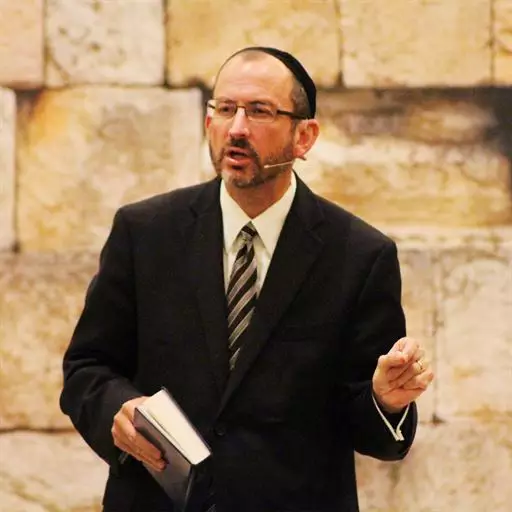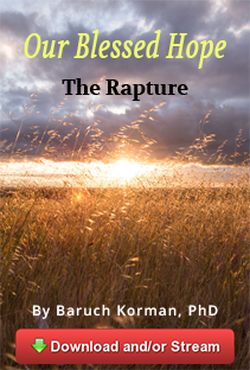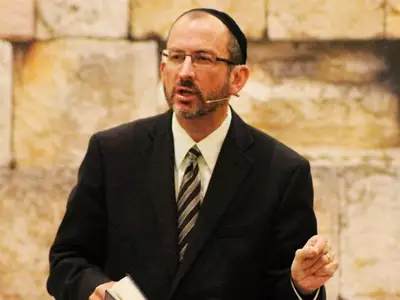Speaker 1
Shalom. And welcome to Via Hafta Yisrael, a Hebrew phrase which means you shall love Israel. We hope you'll stay with us for the next 30 minutes as our teacher, Dr. Baruch, shares his expository teaching from the Bible.
Dr. Baruch is the Senior Lecturer at the Zarah Avraham Institute based in Israel. Although all courses are taught in Hebrew at the institute, Dr. Baruch is pleased to share this weekly address in English.
To find out more about our work in Israel, please visit us on the web at loveisrael.org, that's one word: loveisrael.org.
Now here's Baruch with today's lesson.
Speaker 2
If God allows you in a difficult circumstance, he will not forsake you, he will not leave you, and what he allows you to go through. And here again, it doesn't mean that he's the cause of it, but if he's allowing you to experience this difficulty, there is a purpose for it. And that purpose is preparation for something that's in the future, something that God wants to teach you now through these difficulties so that you're better prepared for what you will encounter in the future, that you will learn something that you will understand, something that you will have greater knowledge and wisdom. So when in the future he calls you to overcome, to pass through this, to behave in a successful way for his purposes, that you will have the knowledge and the ability to do just that.
Well, take out your Bible and look with me to the Book of Psalms and Psalm 141. The book of Psalms and Psalm 141. We have again a Psalm of David. Now, when we were going through the book of Psalms several months ago, I would make mention in regard to the type of psalm that it was, and we haven't been in this type of psalm for a while. We have the word "shear." Now, if you were to ask most Israelis what is the word "shear," they would say a song. But it's also the Hebrew word for a poem. And we know that the Psalms are Hebrew poetry, but this is a different word. It's not the word "shear," but it's the word "mizmore." And that word "mizmore" comes from a Hebrew word which means to prune or to cut away or, in a simple understanding, to remove something from you. And worship is how we do that. There are things right now that are in my life that God's displeased with. And I can want these things out of my life. But the key is this: when I become very serious and committed to worship, then that worship experience is going to change me. Worship is going to help me rid myself of these things that are not efficient in serving God and growing spiritually.
So look with me to this Psalm, Psalm 141. It's a "mizmore," a unique type of psalm, and it was written by David. It says, "Mizmore le David," a Psalm of David. And notice how it begins. "O Lord, I have called unto you." Now, this word "call" is also a word of invitation. In modern Hebrew, we use a different term, but in ancient Hebrew, this is one of the words for inviting. So when David says, "I have called unto you," what he's saying is, "I've invited you into my life, into what I'm experiencing, that you might act and behave and move in my circumstances." And this is wisdom. We should always want God actively involved in our life. How do we do that? Well, if we're in a new covenant relationship with him, prayer is the foundation of inviting God into your life. Be committed in prayer.
So he says here, "I have called unto you," or "I've invited you." And this word is oftentimes translated to cry out in a loud voice. It's a word that speaks about David's desire to capture the attention of God. So he says, "O Lord, I have called to you." And notice David is calling here in a sense of urgency. This is not speculation on my part. We look to the next word and we see that word "husha." Now, "husha" can be translated with haste. It speaks about an urgency that David has called unto the Lord that the Lord might move quickly and immediately in his life for what he's going through. So he says here, "husha lee," make haste unto me. Move quickly unto me. Hear my voice when I call to you. Now, David is not commanding, although it's the language of a command. He is petitioning God. And the tone of his words shows this great urgency that David has for God to act in his life.
And we know something. David was someone who suffered a great deal. David did not have an easy life. Some of it was because of his own decisions, wrong decisions. But then again, much of his suffering was because of David's faithfulness to God, that he made good decisions and the enemies did not like David's decisions. Look on to verse two. We have the first word. It's the Hebrew word "tikkon." Now, this is derived from a word which means to establish. And in this sense, it means to put in a right position. It's interesting when I look at this book and read the biblical Hebrew, but underneath the biblical Hebrew is modern Hebrew to help us understand at least what the editors of this book of Psalms are saying about the words. And they have the phrase "tihiye nihona," which means, may my prayer be correct or right. Here again, David is wanting to communicate with God in regard to what God finds pleasing, what God finds correct and right. He is not motivated by his desire, but he is still petitioning God for God's truth, God's plan, God's purpose. In other words, he is praying in order that David might participate and hear this carefully, remain in the will of God.
So he says here, "may my prayer be correct." And then we have a phrase, "ketorit," which is incense, as incense is before you. Now, the incense that was offered up to God went along with the prayers of the people. We see that, for example, in the book of Revelation; it is a known biblical truth. So there's a relationship between pleasing prayer and the incense offering going up into the nostrils of God as a sweet or pleasing fragrance. So David is saying, "I want my prayers that they should be pleasing unto you, that they would bring about the same enjoyment as smelling these beautiful incense and not burning a strange fire that brings about death, but a pleasing fire, one that is in line with God's formula for incense." David is seeking God's formula for his life, in other words.
And then he talks about his prayer not only as incense, but he uses the phrase "mas at kapai." Now, "kapai" would be my souls. I understand that many Bibles translate this as my hands, but the emphasis in the Hebrew is on the palms of the hand. Why? That they are innocent, that they are pure, that they are not stained with blood. So we're not coming before God guilty. This is the implication here. David is saying, "I'm not guilty of something." Now he's praying that God brings change in his life, that God gets rid of anything that's displeasing to God. But David is coming not bearing some known act of sin or some known act of shame that David has performed. So he says, "as a lifting up of my palms." And the implication is, may this be as a "minkat arif." Now, "arif" is one of the ways in the Bible we say evening. And the word "minkat" is a gift. Now, usually "minka" is thought of as the afternoon prayer, but this is evening prayer. And what David is saying is this: David, the reason why the word "arif" is there is because it gives the student of the scripture a context. David is emphasizing the evening. What comes into your mind when you hear evening? Darkness. This is to tell us David is at a very dark time in his life, not necessarily because of himself, but because of the enemy. And he's asking God to move with haste into his circumstances, that God would enter into the situation that David's going through. And he's saying that he is in darkness.
Now, we know that Paul talks about the sons of darkness. David is in a place of opposition. There are many who are opposed to him. And he's turning to God in faith. He's turning to God, trusting in God, believing in God, relying upon God because he understands something: God is his only solution. There is no one that he can turn to and find this deliverance, this victory in his life. So he says, look at the next verse, verse three, "O Lord, place." And what is David asking God to provide him to set before him? We find the word "shamra lefi," a guarding of his mouth. Now, in the next phrase, he's going to say, "and keep the door of my lips." What David is saying is this: God, I want you to be a filter for my words.
Now, David is extremely wise. Oftentimes when we are in a difficult situation, that doesn't make us happy; it makes us frustrated or angry at times. And what happens? We allow our emotion to influence our speech. That is never, never a good thing to do. It's never wise. And David understands that. Here's the principle: he's saying, "God, I want you to filter my words. I want you to guard my mouth; I want you to keep my lips, that I do not speak anything that is disappointing to you." And he talks about the door of his lips, meaning the opening of his mouth. He does not want to say something that he ought not say. And many times when we're under pressure, that we're under stress, we're going through a bad circumstance, what happens? We say things that we ought not. David is sensitive to that and saying, "Don't allow me to speak such words."
Look now to verse four: "Do not incline my heart." Now, what's he speaking about? Heart is synonymous with thought. So David, he's not only concerned about his speech, but also how he thinks. And he asks God, again, look at it. He says, "Do not incline my heart to an evil thing." Now, the word that I translated "thing" is the word "davar." It can be a word, a thing. Sometimes in modern Hebrew, if we want to say the word "stuff," we can use the word "devar." But the point is David wants no connection to anything evil in his thought process. He wants to think clearly. He wants to think in obedience to God's plan. And then he goes on to say, "and not to." The implication is, "and not to act or to behave in any deed of wickedness." So not in any wicked deeds.
So David doesn't want to say something he ought not, he doesn't want to think something he ought not, and he doesn't want to do something that he ought not. That's David's heart. Let me ask you a question. Is that yours? This is how we should think as well. And he goes on and closes out this verse by saying, "and, and men." What type of men? Men that are workers of iniquity, men who work wickedness. He doesn't want anything to do with them. Nor he says, look at how this verse concludes, "U vow Elham, be man am." Now what's that? That I would not eat any of their delicacies.
Now, we live in an age of abundance. Most people, I understand, poverty is real. Hunger is still a problem in this world. But for many people, especially those in the West, there is an abundance of food. It's amazing. If you live, for example, in America or Western Europe, you're amazed at how much food is just thrown out. Why? Because of this abundance. But this was not always the case, and hunger was a real problem for most of human history. People were looking for food. In fact, they spent a great deal of their waking hours working in order to provide so they would have enough nourishment. And what David is saying here is this: I do not want myself to be influenced by anything that is against your will, anything that is wicked. I want you to guard my thoughts, guard my speech, and also don't allow this natural human desire for the delicacies, the finer food, to influence me. I don't want my stomach to take the bribe of these delicacies, these fine foods, and allow my desire for good food to influence my decisions, where I make displeasing decisions to you, that I would think in a way that I would ought not do something that I should not do or say something that I should not. This is David's heart.
Look now to verse five. Now, the subject of verse five is a righteous one. And David is saying something, and it's very, very, we might say, hyperbole. Why do I say that? Because he says, "a righteous one, he will hit me." And what will he hit David with? The word is "chesed." Grace. That's what a righteous person does. He bestows grace. Why? What is a righteous person concerned with? God's will. And learn this biblical truth: there is a connection between the grace of God and the righteous will of God. You will never be able to do the righteous will of God without first being a recipient of grace. The grace of God that we access by faith. The grace of God works in our life to save us, but also works in our life in order to bring us into obedience to God's will.
So he says here, "a righteous one, well, if they should hit me, this righteous one will hit me with grace and will reprove me." Well, what is that reproof going to be like? He tells us it's like the anointing oil. Now it uses the phrase "shemin, Rosh." Rosh is head, shemin is oil. So it was very common when people wanted to pamper themselves, to live in a type of luxury. They would anoint their head with oil that was very pleasing. So he says this: this anointing oil, do not refuse from my head. Now this anointing oil has a purpose. It is pleasing, and it is related to the praises of the people of God. So what David is saying is if a righteous one should hit me, if a righteous one should reprove me or rebuke me, what is it like? They are going to give me grace, and that grace is going to work in my life, that in the end, what am I going to want to do? Praise God, give him thanks.
So he's speaking about how righteousness benefits us. Righteousness is pleasing to us. Righteousness is going to bring that which is comforting to us and enjoyable to us. He goes on to say, look at how this verse ends where he says, "for still my prayer is against their evilness," and evilness here is in the plural. So still David hasn't changed. His prayer is against their evilness. He wants nothing to do with anything that is apart from the will of God.
Look now to verse six. Now we're going to move into a section within the psalm that is somewhat difficult to interpret and understand. And I would suggest to you that it's very important that you hear what David is saying in verse six because it lays a foundation for understanding the intent of David in the next few verses. Where he says in the first word is "nish." Me too, it comes from the same word, "Shemitah." Now "Shemitah" is when we do not sow the fields; we do not do anything with agriculture at that time; we leave agriculture alone. And what he's saying here in the subject here is, look at the fourth word in the text. It's the subject; it's the term "shoftehem." Their judges. Now, their judges are corrupt. Their judges can be bribed. Their judges are not concerned about justice. And therefore, what is David saying? He says their judges think most Bibles will have this word for "Shemitah" as meaning to fall or to slip. And the implication is that they would slip from the cliffs of rocks.
Now, what is speaking about here? They would fall down onto the rock. And the implication is that they would meet their death, that they would be crushed, having fallen on the rocks. Now, a little bit about me. One of the things that I like to watch is when I go on YouTube are videos about animals and just how they behave in nature. And you see sometimes these goats that they're able to climb up such a steep wall where there's only a small groove for them to get a foothold. And sometimes there's bears and leopards and wild cats that want to eat these goats, these types of animals. And what happens as they're chasing, as one's chasing and the other one's fleeing, occasionally they will fall. And you see what happens, that they fall to their death. This is what David is praying for against these corrupt judges, that they would fall into the rocks.
And he says here that they would hear that my words, that they are pleasant. Now, what does David, what is he asking for? Don't miss it. He's asking for judgment. And understand that God's judgment is a righteous judgment; God's judgment is a good judgment. Why? The righteous and good judgment of God brings about the order of God. It puts things as God wants it to be. So this is what David is praying for, that these unrighteous judges, these corrupt judges, that they go off the cliff, so to speak, and they meet therein, that they are dashed upon the cliffs that are full of rocks, and these things, he wants the enemy to hear that these words, this report of what happened to their corrupt judges, that they would be pleasing or pleasant to David.
Move on to verse seven. Now, it's only when we remember what we just talked about. David is saying, "I want these corrupt individuals, these that are more influenced by a bribe in order to please their stomachs rather than to please God. I want such individuals judged." Remember that when we get to verse seven, he says, "it is like a segment." Now, some will say this word. It's a word for what I would call simply breaking something into pieces or segments. I believe most English Bibles will translate this as plowing. But it has a very, very what I would call a many usages and many definitions for understanding it. So like segment. Like a segment and like something that is broken up in the land. So he's still talking about these judgments, that they might be made into pieces, that they may be separated, and that they would be broken into pieces in the earth.
And then he talks about how this is the implication, how our bones are spread out at the mouth of Sheol. Now, what he's talking about here is how in this corruption, when judges are corrupt, who suffers? The wealthy people? No, who suffers? The poor, the ones that have no one on their side. They are easily exploited, easily taken advantage of. And therefore, David is saying something. He's saying, "I want these corrupt judges, these ones that take bribes. They're not interested in what's right and proper. I want them to be judged so that they can experience the same thing that the simple people are whose bodies and bones, as it says here, whose bones are scattered at the foot of Sheol." What it's telling us is this incorrect judgment that these corrupt judges are giving are bringing about the death of the innocent, of the poor, those who have no one on their side.
And then he says, look now to verse eight. "For unto you, God, Lord, are my eyes." So David is saying, "I'm not looking towards these judges for justice, but rather my eyes are unto you, Lord, God." And he goes on to say,
Speaker 1
Well, we hope you will benefit from today's message and share it with others. Please plan to join us each week at this time and on this channel for our broadcast of loveisrael.org.
Again, to find out more about us, please visit our website loveisrael.org. There you will find articles and numerous other lectures by Baruch. These teachings are in video form; you may download them or watch them in streaming video.
Until next week, may the Lord bless you in our Messiah Yeshua, that is Jesus, as you walk with him. Shalom from Israel.

 Learn How
Learn How






